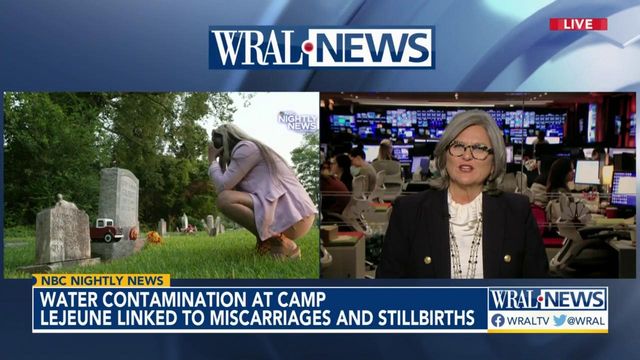NBC News: Toxic water led to miscarriages decades ago at Camp Lejeune
An NBC News investigation looks at some of the smallest victims of one of the largest water contamination cases in United States history.
Records indicate hundreds of babies are buried in a cemetery near Camp Lejeune in North Carolina, where NBC News' Cynthia McFadden met a group of women still grieving and looking for justice.
The women and up to 1 million people who lived or worked at Camp Lejeune may have been exposed to contaminated drinking water between 1953 and 1987.
The government acknowledges that among the serious health conditions from the toxic water is female infertility, miscarriage and potentially deadly birth defects.
NBC News spoke with dozens of marines and military wives -- now seniors -- who all lost pregnancies and babies. They said no one has been held accountable for decades of loss.
Interview log from NBC News with Jeri Kosabarich, a Marine wife at Camp Lejeune:
Cynthia McFadden: About a month left before delivery and you went and what did the doctor say to you?
Jeri Kosabarich: The doctor said your baby is dead and it's not my fault. Remember it's not our fault or mine.
Cynthia McFadden: It's just so stunning that first, any doctor would say that to his patient or her patient.
Jeri Kosabarich: And didn't even help me off the table, left the room. I had to find my way out. there are some things you never forget.
Interview log from NBC News with Crystal Dickens, a veteran Marine at Camp Lejeune:
Cynthia McFadden: Three miscarriages?
Crystal Dickens: Yes.
Cynthia McFadden: Did you think there was anything unusual about that?
Crystal Dickens: I didn't know, I was young. I probably should have looked further into it and why, but we didn't know. We had no clue. We were just in a cesspool type situation and we lost babies and they didn't think that it was important ... and still don't.
Cynthia McFadden: Who's they?
Crystal Dickens: The military.
The contaminated water, which was used for cooking, drinking and bathing, could impact the health of people who lived, worked or served at Camp Lejeune for at least 30 days between Aug. 1, 1953, and Dec. 31, 1987.
Common injuries, diseases and illnesses resulting from the contamination include various cancers, miscarriage, leukemia, Parkinson’s Disease and birth defects.













